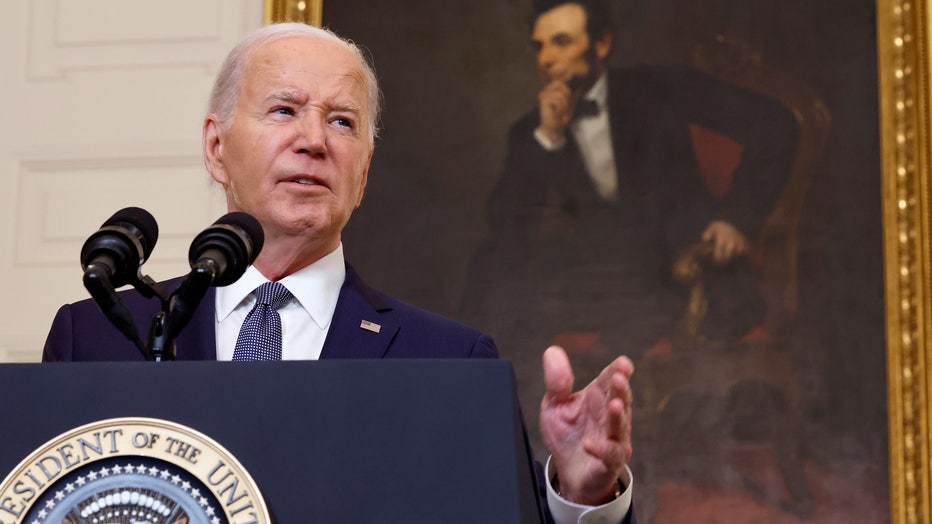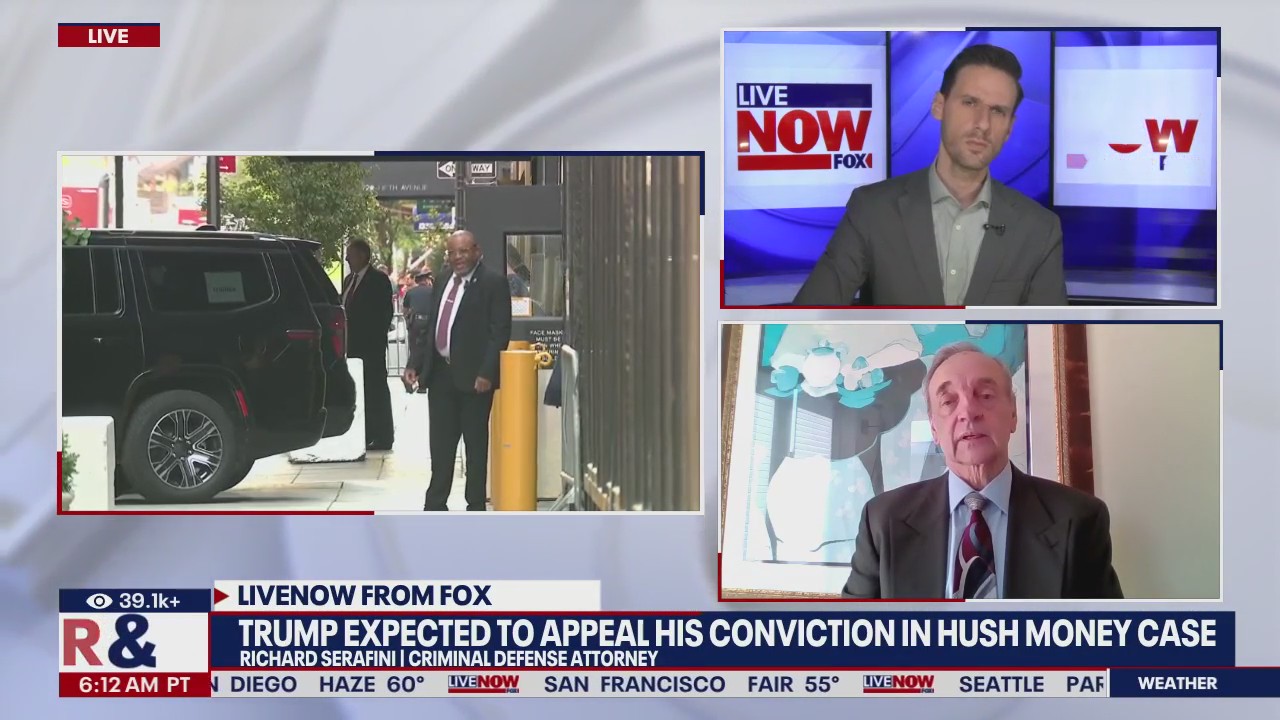Biden on Trump conviction: 'The American system of justice works'

Biden speaks on Trump verdict
President Joe Biden responded to the guilty verdict in Trump's hush-money trial, telling reporters that "it's reckless, it's dangerous, it's irresponsible for anyone to say this was rigged just because they don't like the verdict."
President Joe Biden addressed Donald Trump's guilty verdict in his hush-money trial on Friday, noting that "The American system of justice works" and calling it "reckless, dangerous and irresponsible" to attack the trial as rigged.
A jury found Trump guilty Thursday on all 34 felony counts of falsifying business records in his hush money trial – becoming the first president in history to be convicted of a crime.
Biden made the remarks before discussing a ceasefire proposal in the Israel-Hamas war. They came shortly after Trump held a press conference in the lobby of Trump Tower, making multiple false statements and attacking the judge, prosecutor's office and other aspects of the case.

U.S. President Joe Biden delivers remarks on former U.S. President Donald Trump’s guilty verdict in his hush-money trial before speaking on the Middle East at the White House on May 31, 2024 in Washington, DC. (Photo by Chip Somodevilla/Getty Images)
"The American principle that no one is above the law was reaffirmed," Biden said. "Donald Trump was given every opportunity to defend himself. It was a state case, not a federal case. And it was heard by a jury of 12 citizens, 12 Americans, 12 people like you. Like millions of Americans who served on juries, this jury was chosen the same way every jury in America's chosen. After careful deliberation, the jury reached a unanimous verdict. They found Donald Trump guilty on all 34 felony counts. Now they’ll be given the opportunity, as he should, to appeal that decision, just like everyone else.
"The American system of justice works, and it's reckless, it's dangerous, it's irresponsible for anyone to say this was rigged just because they don't like the verdict," Biden continued. "Our justice system has endured for nearly 250 years, and it literally is the cornerstone of America. Our justice system should be respected. And we should never allow anyone to tear it down. It's as simple as that. That's America. That's who we'll always be, God willing."
Biden’s campaign had largely ignored the trial since it began six weeks ago in a purposeful effort to highlight the independence of the judiciary. But in recent days his campaign began capitalizing on the trial’s closing moments.
On the day of closing arguments, the campaign brought in actor Robert De Niro and law enforcement officers who had defended the U.S. Capitol during the insurrection on Jan. 6, 2021, to denounce Trump in a press conference near the lower Manhattan courthouse.
RELATED: Robert De Niro speaks at Trump’s trial, calls him ‘clown,’ ‘buffoon,’ ‘grubby real estate hustler’
The Biden campaign also released a new ad earlier this month that was narrated by De Niro sharply criticizing Trump’s presidency and plans if he’s reelected.
Trump’s political allies have appeared on his behalf as well outside the courthouse throughout the trial, including U.S. Rep. Byron Donalds of Florida and North Dakota Gov. Doug Burgum, who are both considered possible vice presidential candidates for Trump.
Trump falsely claims ‘trial was rigged’

Donald Trump news conference amid guilty verdict
Donald Trump holds news conference following guilty verdict in hush-money trial, says he will fight all charges, and win the election. NOTE: This press conference contains multiple falsehoods about the trial and the officials involved.
Trump held a press conference in the lobby of Trump Tower Friday, making multiple false statements and attacking the judge, prosecutor's office and other aspects of the case.
RELATED: Trump speaks at press conference, falsely claiming 'trial was rigged'
"If they can do this to me, they can do this to anyone," Trump lamented. "And these are bad people. These are in many cases, I believe, sick people.
In his disjointed remarks, Trump initially started attacking Biden on immigration and tax policies before pivoting to his case, growling that he was threatened with jail time if he violated a gag order. He picked apart intricate parts of the case and trial proceedings as unfair, making false statements and misrepresentations as he did so.
"It was a rigged trial," the former president and 2024 Republican nominee falsely claimed. "We wanted a venue change where we could have a fair trial. We didn't get it. We wanted a judge change, we wanted a judge that wasn't conflicted, and obviously he didn't do that."
Trump could have testified in his own defense during the trial, but opted not to. Friday, he said, "I would have loved to have testified."
"To this day I would have liked to testify," he said.
What's next for Trump?
Next comes the sentencing, which was scheduled for July 11 – just days before the Republican National Convention – as well as a lengthy appellate process.
All the while, the presumptive Republican presidential nominee still has to deal with three more criminal cases and a campaign that could see him return to the White House.
The Manhattan jury spent more than nine hours deliberating before finding Trump guilty of falsifying business records in the case stemming from a hush money payment to porn actor Stormy Daniels during his 2016 presidential campaign.
After the verdict was read, Trump angrily denounced the trial as a "disgrace," telling reporters he’s an "innocent man."

Trump found guilty of 34 felony counts, what's next?
Donald Trump is expected to be sentenced on July 11, days before the Republican National Convention, following a guilty verdict in New York on Thursday. Criminal defense attorney Robert McWhirter joins LiveNOW from FOX to explore the verdict, and what is to come.
Here are some key takeaways from Trump’s conviction:
Will Donald Trump go to prison?

Trump's sentencing set for July
A New York jury found former President Donald Trump guilty of falsifying business records in an attempt to bury stories about extramarital affairs that arose during his 2016 presidential campaign. Sentencing is set for July 11. LiveNOW's Andrew Craft spoke about the possibility of prison time with attorney Matt Tympanick.
The big question now is whether Trump could go to prison. The answer is uncertain, according to the Associated Press.
Judge Juan M. Merchan set sentencing for mid July, days before Republicans are formally set to nominate Trump for president.
The charge of falsifying business records is a Class E felony in New York, the lowest tier of felony charges in the state. It is punishable by up to four years in prison, though the punishment would ultimately be up to the judge, and there’s no guarantee he would give Trump time behind bars. Manhattan District Attorney Alvin Bragg declined to say whether prosecutors would seek prison time.
It’s unclear to what extent the judge may factor in the political and logistical complexities of jailing a former president who is running to reclaim the White House.
Other punishments could include a fine or probation. And it’s possible the judge would allow Trump to avoid serving any punishment until after he exhausts his appeals.
Trump faces the threat of more serious prison time in the three other cases he’s facing, but those cases have gotten bogged down by appeals and other legal fights, so it remains unclear whether any of them will go to trial before the November election.
Can Trump still be president? What his conviction means for the election

Can Trump still vote for himself in 2024 election?
Donald Trump may be convicted of a felony and reside in Florida, but he can still vote as long as he stays out of prison in New York state. LiveNOW's Andrew Craft spoke about Trump's rights now that he's a convicted felon with attorney Neama Rahmani.
The conviction doesn’t bar Trump from continuing his campaign or becoming president. The Constitution only states that presidential candidates must be at least 35 years old, be "natural born" citizens and have lived in the United States for at least 14 years.
There are no restrictions based on a criminal record.
He can also still vote for himself in his home state of Florida as long as he stays out of prison in New York state.
Trump’s daughter-in-law Lara Trump, who serves as co-chair of the Republican National Committee, said in a FOX News Channel interview on Thursday that Trump would do virtual rallies and campaign events if he’s convicted and sentenced to home confinement.
In a deeply divided America, it’s unclear whether Trump’s once-unimaginable criminal conviction will have any impact at all on the election.
Leading strategists in both parties believe that Trump still remains well-positioned to defeat President Joe Biden, even as the Republican now faces the prospect of a prison sentence and three separate criminal cases still outstanding.
In the short term, at least, there were immediate signs that the guilty verdict was helping to unify the Republican Party’s disparate factions as GOP officials across the political spectrum rallied behind their presumptive presidential nominee and his campaign reported a flood of fundraising dollars within hours of the verdict.
There has been some polling conducted on the prospect of a guilty verdict, although such hypothetical scenarios are notoriously difficult to predict. A recent ABC News/Ipsos poll found that only 4% of Trump’s supporters said they would withdraw their backing if he’s convicted of a felony, though another 16% said they would reconsider it.
Trump's avenues for appeal

Trump expected to appeal hush money conviction
Richard Serafini, a criminal defense attorney joined LiveNOW from FOX's Josh Breslow to discuss the steps in the appeal process as former President Trump attempts to get his conviction overturned.
After Trump is sentenced, he can challenge his conviction in a New York appellate court and possibly the state’s highest court. Trump’s lawyers have already been laying the groundwork for appeals with objections to the charges and rulings at trial.
The defense has accused the judge of bias, citing his daughter’s work heading a firm whose clients have included Biden, Vice President Kamala Harris and other Democrats. The judge refused the defense’s request to remove himself from the case, saying he was certain of his "ability to be fair and impartial."
Trump’s lawyers may also raise on appeal the judge’s ruling limiting the testimony of a potential defense expert witness. The defense wanted to call Bradley Smith, who served on the Federal Election Commission, to rebut the prosecution’s contention that the hush money payments amounted to campaign finance violations.
But the defense ended up not having him testify after the judge ruled he could give general background on the FEC but couldn’t interpret how federal campaign finance laws apply to the facts of Trump’s case or opine on whether Trump’s alleged actions violate those laws. There are often guardrails around expert testimony on legal matters, on the basis that it’s up to a judge — not an expert hired by one side or the other — to instruct jurors on applicable laws.
The defense may also argue that jurors were improperly allowed to hear sometimes graphic testimony from Daniels about her alleged 2006 sexual encounter with Trump, which he denies ever happened. The defense unsuccessfully pushed for a mistrial over the tawdry details prosecutors elicited from Daniels.
Defense lawyer Todd Blanche argued Daniels’ description of a power imbalance with the older, taller Trump, was a "dog whistle for rape," irrelevant to the charges at hand, and "the kind of testimony that makes it impossible to come back from."
The Associated Press contributed to this report.

